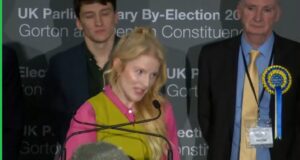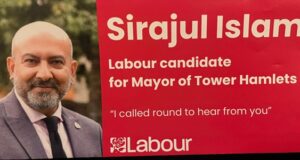IMAGINE THE scenario. An unelected leader visits a country’s parliament – and sits in a chamber of unelected members of parliament and summons the elected representatives of the people to hear what the elected leader has sanctioned as the legislative programme for the next two years.
That sounds like the lack of democracy which British toffs would scoff at, if it happened in a non-western country – but it is what has happened today in the British Parliament.
Put it another way. The governing party has just called a snap General Election and put forward its manifesto – and it has lost MPs in the process, which suggests that the Party has decreased in popularity. During the same General Election, the main opposition party has put forward its own manifesto and gained in popularity and increased its number of MPs.
No one party has an overall majority, so the best any party can hope to do is to form a minority government. The party which became less popular during the election did get more MPs elected – so it gets the first chance to form a Government. But because its policies are not very popular, it cannot put its manifesto promises forward as a programme for government because they would not be passed by the elected chamber. So instead, it puts forward a legislative programme which wasn’t featured in its manifesto, in the hope of winning enough support, with the assistance of a few MPs from the North of Ireland whose manifesto was never voted on by the electorate as a whole.
This is what has happened in the British Parliament today. And this is why Jeremy Corbyn is right to claim that he is justified in claiming a right to try to form a government. It’s not because of how many MPs his party ended up with – it’s because his government would at least govern on the basis of the manifesto it put to the people, not the one it didn’t. It’s enough to give an “A”-level politics student a headache and send them running to ask if the Exam Board got the question wrong.
The Queen was on monarch-lite detail: no consort; no crown on her head (just a fetching hat which bore a passing similarity to an EU flag) and no ceremonial robes. Instead of Philip, the Queen was sat next to by Charles – who is already 36 years old than Philip was the first time he did a Queen’s Speech. Charles fitted in very well. Despite years of waffle about how important the pomp and ceremony is to British democracy, it turns out that the Queen can read the Prime Minister’s speech just as well without a crown on her head as she can with.
The Queen was also a couple of days late, as Theresa May tried (and failed) to cobble together an agreement with the Ulster Unionists to support her minority government. As Black Rod came to the House of Commons to summons elected MPs to listen to Her Majesty speaking in the Chamber of unelected parliamentarians, Dennis Skinner MP did his usual interjection. This year he told MPs to hurry over to the Lords, because the first horse race at Royal Ascot started at 2.30pm – implying the Queen would be rushing off to the races as soon as she had got Parliament opened.
Having had to jettison all of her controversial policies, Theresa May made the Queen concentrate on Brexit. This session of Parliament will last two years and deal with items relating to Brexit: immigration, trade and sectors of the economy that will be particularly affected by leaving the EU, such as agriculture and fishing.
On other policy areas, such as social care and energy costs, there will be public consutations on what to do. We might even end up having a public consultation which ends up backing a proposal from the Labour manifesto – it would be interesting to see if the Tory minority government implemented it. On other policy areas, we have minor proposals – some of which would be important gains, but most of which are little more than minor bills to tidy things up.
The only other interesting feature of the Speech was that Her Majesty did not mention Donald Trump coming over – leading to much hope that the State Visit he had been promised has been kicked into the long grass.
The Queen’s Speech will now be debated for a week – and then there will be a vote which Theresa May must win if she is to continue to govern. If she loses it, we would enjoy the spectacle of the Queen inviting Jeremy Corbyn over and asking him to try to form a Government. Corbyn would write a new Queen’s Speech, and the Queen would have to come back to the Lords to deliver it – promising that her Government would now do the complete opposite of what she had said just days previously. And Parliament would have another debate for a week and then a vote. If Corbyn won that vote, he would be Prime Minister of a minority government. If he lost, there would be little alternative but to have a second General Election.
Cross your fingers…
•Read more about it:
Grenfell latest: can May survive?
Corbyn up; May down – but Parliament hung
[Adverts]
 East London News A Force for the community…
East London News A Force for the community…




